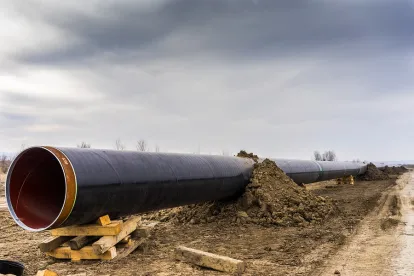Multiple Pipeline Safety Reauthorization Bills Propose Amending Pipeline Safety Laws
Funding authorization for the federal Pipeline Safety Laws expires September 30. Multiple proposals to reauthorize funding and amend the Pipeline Safety Laws are under consideration, with additional bills expected. Below is an overview of recent developments.
House Energy & Commerce Committee: On June 19, the House Energy and Commerce Committee’s Subcommittee on Energy convened a hearing regarding a discussion draft of the Safer Pipelines Act of 2019, which would authorize funding through 2023 and amend the Pipeline Safety Laws. Witnesses included industry representatives and safety advocates. On June 24, Representative Bobby Rush (D-IL) introduced a revised version of the bill, H.R. 3432, and on June 26 the Subcommittee convened a mark-up and approved the legislation by a voice vote. Numerous amendments to the bill were offered and withdrawn with a commitment by the subcommittee to develop a bipartisan bill. The full Committee is expected to mark up the bill before the August recess.
Other proposed legislation includes the Protecting Our Infrastructure of Pipelines and Enhancing Safety Act, submitted by the Department of Transportation (DOT) and the Leonel Rondon Pipeline Safety Act S.1097/H.R. 2139, introduced by Massachusetts Senators Edward Markey and Elizabeth Warren and Massachusetts representative Lori Trahan.
Proposed legislation is expected to be considered by the House Transportation and Infrastructure Committee and the Senate Commerce, Science and Transportation Committee.
The Gas Pipeline Advisory Committee Considers Proposed Gas Gathering Regulations
On June 25-26, the Gas Pipeline Advisory Committee (GPAC) met to consider the Pipeline and Hazardous Materials Safety Administration’s (PHMSA) notice of proposed rulemaking (NPRM) to amend the federal safety regulations applicable to gas gathering pipelines. Originally included as part of PHMSA’s NPRM issued in April 2016 to comprehensively revise regulations applicable to gas transmission and gathering pipelines, the gathering provisions are now being considered in a separate rulemaking.
The GPAC approved recommendations to guide PHMSA’s development of pipeline safety requirements that will apply to gas gathering pipelines 8” or more in diameter in Class 1 Locations and operating at or above stress levels of 20% of specified minimum yield strength (SMYS). The GPAC also approved recommendations that PHMSA withdraw a proposal to redefine the beginning and ending points of gathering and apply Part 191 reporting requirements to unregulated gathering. Presentation materials and other information related to the meeting are available here.
Revised PHMSA Rulemakings Update. The chart below shows the status of PHMSA’ pending pipeline safety rulemaking initiatives as reflected in DOT’s June Significant Rulemaking Report, PHMSA’s status Chart of legislatively mandated actions, and the Office of Management & Budget’s (OMB) Office of Information and Regulatory Affairs (OIRA) Spring 2019 Unified Agenda of Regulatory and Deregulatory Actions. The Unified Agenda appears in two principal parts, Current Agenda Agency Regulatory Entries for Active Actions and Current Long Term Actions. Revised information appears in bold.
PHMSA has announced that the Gas Transmission Final Rule (Safety of Gas Transmission Pipelines MAOP Reconfirmation, Expansion of Assessment Requirements and Other Related Amendments) and Valve Installation and Minimum Rupture Detection Standards NPRM have been transmitted to OMB. Under Executive Order (EO) 12866, OMB reviews proposed significant rules to ensure they are consistent with applicable law, the President’s priorities, and the principles set forth in the EO, and to ensure the proposals do not conflict with another agency’s policies or actions. OMB also analyzes the cost-benefit analyses in support of the proposals. The EO sets out deadlines for OMB evaluation, but review periods are often extended.
Pending Final Rules
|
Proceeding |
DOT Estimated Publication |
OIRA Estimated Publication |
PHMSA’s Chart |
|
Emergency Order Procedures |
August 1, 2019 |
May 2019 |
April 22, 2019 |
|
Safety of Gas Transmission Pipelines, MAOP Reconfirmation, Expansion of Assessment Requirements and Other Related Amendments |
August 30, 2019 |
July 2019 |
July 2, 2019 |
|
Safety of Gas Transmission Pipelines, Repair Criteria, Integrity Management Improvements, Cathodic Protection, Management of Change, and Other Related Amendments |
December 20, 2019 |
December 2019 |
Not Listed |
|
Safety of Gas Gathering Pipelines |
June 26, 2020 |
December 2019 |
Not Listed |
|
Safety of Onshore Hazardous Liquid Pipelines |
June 28, 2019 |
December 2018 |
June 18, 2019 |
|
Underground Natural Gas Storage Facilities |
September 30, 2019 |
July 2019 |
July 2, 2019 |
Pending Notices of Proposed Rulemakings
|
Proceeding |
DOT Estimated Publication |
OIRA Estimated Publication |
PHMSA’s Chart |
|
Amendments to LNG Facilities |
September 2, 2019 | October 2019 | Not Listed |
|
Class Location Requirements |
November 15, 2019 |
November 2019 |
Not Listed |
|
Gas Pipeline Regulatory Reform |
September 30, 2019 |
August 2019 |
Not Listed |
|
LNG by Rail |
July 29, 2019 | Not Listed | Not Listed |
|
Liquid Pipeline Regulatory Reform |
Not Listed |
June 2019 |
Not Listed |
|
Periodic Standards Update |
Not Listed |
April 2020 |
Not Listed |
|
Repair Criteria for Hazardous Liquid Pipelines |
June 26, 2020 |
Next Action Undetermined |
Not Listed |
|
Valve Installation and Minimum Rupture Detection Standards |
September 27, 2019 |
August 2019 |
August 7, 2019 |
Pending Advance Notices of Proposed Rulemakings
|
Proceeding |
DOT Estimated Publication |
OIRA Estimated Publication |
PHMSA’s Chart |
|
Coastal Ecological Unusually Sensitive Areas |
Not Listed |
April 2020 |
Not Specified |
Other PHMSA Updates
PHMSA convenes public meeting on public awareness and amending the definition of USA. On June 12-13, PHMSA convened a public meeting to address (1) amending the definition of Unusually Sensitive Areas (USA) for the Great Lakes, coastal beaches, and marine coastal waters areas and (2) public awareness and engagement. Proximity to a USA is one method of determining if a hazardous liquid pipeline could affect an HCA, making the pipeline subject to PHMSA’s integrity management regulations. Section 19 of the Protecting our Infrastructure of Pipelines and Enhancing Safety Act of 2016 required PHMSA to amend the definition of USA to include the Great Lakes, coastal beaches, and marine coastal waters. To address this mandate, PHMSA must define, identify data sources, and maintain a map of these areas in the National Pipeline Mapping System. With respect to public awareness, PHMSA sought input on the most effective methods to inform all stakeholders on shared responsibilities with respect to pipeline safety.






 />i
/>i

